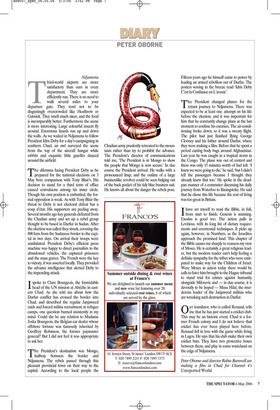Ndjamena
Third-world airports are more satisfactory than ours in every department. They are more efficiently run. There is no need to walk several miles to your departure gate. They tend not to be disgustingly overcrowded like Heathrow or Gatwick. They smell much nicer, and the food is incomparably better. Furthermore the scene is more interesting. Large colourful insects fly around. Enormous lizards run up and down the walls. As we waited in Ndjamena to follow President Idris Deby for a day’s campaigning in southern Chad, an owl surveyed the scene from the top of the aircraft hangar while rabbits and exquisite little gazelles danced around the airfield.
The dilemma facing President Deby as he prepared for the national elections on 3 May bore comparison with Tony Blair’s. His decision to stand for a third term of office caused convulsions among his inner circle. Though his own position is embattled, the formal opposition is weak. As with Tony Blair the threat to Deby is not electoral defeat but a coup d’état. His supporters are peeling away. Several months ago key generals defected from the Chadian army and set up a rebel group thought to be based in Darfur in Sudan. After the election was called they struck, covering the 800 kms from the Sudanese border to the capital in two days. On arrival their troops were annihilated. President Deby’s efficient press machine was happy to direct journalists to the abandoned vehicles, the captured prisoners and the mass graves. The French were the key to victory, it was asserted locally. They provided the advance intelligence that alerted Deby to the impending attack.
Ispoke to Clare Bourgeois, the formidable head of the UN mission at Abéche in eastern Chad. As she told me about how the Darfur conflict has crossed the border into Chad, and described the regular Janjaweed raids and forced militia recruitment at refugee camps, one question burned insistently in my mind. Could she be any relation to Madame Joska Bourgeois, the Belgian car dealer whose offshore fortune was famously inherited by Geoffrey Robinson, the former paymaster general? But I did not feel it was appropriate to ask her.
The President’s destination was Mongo, halfway between the border and Ndjamena. The rebels passed through this pleasant provincial town on their way to the capital. According to the local people the Chadian army prudently retreated to the mountains rather than try to prohibit the advance. The President’s director of communications told me, ‘The President is in Mongo to show the people that Mongo is now secure.’ In due course the President arrived. He walks with a pronounced limp, and the outline of a large businesslike revolver could be seen bulging out of the back pocket of his tidy blue business suit. He knows all about the danger the rebels pose. Fifteen years ago he himself came to power by leading an armed rebellion out of Darfur. The posters waving in the breeze read ‘Idris Deby C’est la Confiance en L’avenir.’ The President changed planes for the return journey to Ndjamena. There was expected to be at least one attempt on his life before the election, and it was important for him that he constantly change plans at the last moment to confuse his enemies. The air-conditioning broke down, so it was a sweaty flight. The pilot had just finished flying George Clooney and his father around Darfur, where they were making a film. Before that he spent a period carting body bags around Afghanistan. Last year he was caught in a tropical storm in the Congo. The plane was out of control and there was only 15 minutes worth of fuel left. ‘I knew we were going to die,’ he said, ‘but I didn’t tell the passengers because I thought they already knew that too.’ He spoke in the deadpan manner of a commuter discussing his daily journey from Waterloo to Basingstoke. He said that he chose this life because the cost of living was too great in Britain.
Ihave set myself to read the Bible, in full, from start to finish. Genesis is stunning. Exodus is good too. The action palls in Leviticus, with its long list of dietary requirements and ceremonial techniques. It picks up again, however, in Numbers, as the Israelites approach the promised land. This chapter of the Bible causes me sharply to reassess my view of Moses. He is certainly a great religious leader, but the modern reader can’t help feeling a definite sympathy for the tribes who were extirpated to make way for the Children of Israel. Were Moses in action today there would be calls to have him brought to the Hague tribunal to stand trial for crimes against humanity alongside Milosevic and — in due course, it is devoutly to be hoped — Musa Hilal, the murderous leader of the Janjaweed militias who are wreaking such destruction in Darfur.
Our translator, who is called Renaud, tells me that he has just started a cricket club. This may be an historic event. Chad is a former French colony and I do not believe that cricket has ever been played here before. Renaud fell in love with the game while living in Lagos. He says that his club make their own cricket bats. They have two protective boxes between them, and play in some wasteland on the edge of Ndjamena.
Peter Oborne and director Robin Barnwell are making a film in Chad for Channel 4’s Unreported World.














































 Previous page
Previous page